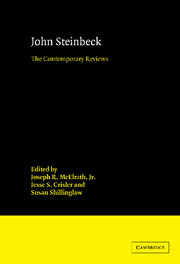Book contents
- Frontmatter
- Contents
- Series Editor's Preface
- Introduction
- 1 Cup of Gold (1929)
- 2 The Pastures of Heaven (1932)
- 3 To a God Unknown (1933)
- 4 Tortilla Flat (1935)
- 5 In Dubious Battle (1936)
- 6 Of Mice and Men (the novel, 1937)
- 7 The Red Pony (1937)
- 8 Of Mice and Men (the play, 1937)
- 9 The Long Valley (1938)
- 10 The Grapes of Wrath (1939)
- 11 The Forgotten Village (1941)
- 12 Sea of Cortez (1941)
- 13 The Moon Is Down (the novel, 1942)
- 14 The Moon Is Down (the play, 1942)
- 15 Bombs Away (1942)
- 16 Cannery Row (1945)
- 17 The Wayward Bus (1947)
- 18 The Pearl (1947)
- 19 A Russian Journal (1948)
- 20 Burning Bright (the novel, 1950)
- 21 Burning Bright (the play, 1950)
- 22 The Log from the Sea of Cortez (1951)
- 23 East of Eden (1952)
- 24 Sweet Thursday (1954)
- 25 The Short Reign of Pippin IV (1957)
- 26 Once There Was a War (1958)
- 27 The Winter of Our Discontent (1961)
- 28 Travels with Charley in Search of America (1962)
- 29 America and Americans (1966)
- 30 Journal of a Novel: The East of Eden Letters (1969)
- 31 The Acts of King Arthur and His Noble Knights (1976)
- 32 Working Days: The Journals of The Grapes of Wrath 1938–1941 (1989)
- Index
4 - Tortilla Flat (1935)
Published online by Cambridge University Press: 03 May 2010
- Frontmatter
- Contents
- Series Editor's Preface
- Introduction
- 1 Cup of Gold (1929)
- 2 The Pastures of Heaven (1932)
- 3 To a God Unknown (1933)
- 4 Tortilla Flat (1935)
- 5 In Dubious Battle (1936)
- 6 Of Mice and Men (the novel, 1937)
- 7 The Red Pony (1937)
- 8 Of Mice and Men (the play, 1937)
- 9 The Long Valley (1938)
- 10 The Grapes of Wrath (1939)
- 11 The Forgotten Village (1941)
- 12 Sea of Cortez (1941)
- 13 The Moon Is Down (the novel, 1942)
- 14 The Moon Is Down (the play, 1942)
- 15 Bombs Away (1942)
- 16 Cannery Row (1945)
- 17 The Wayward Bus (1947)
- 18 The Pearl (1947)
- 19 A Russian Journal (1948)
- 20 Burning Bright (the novel, 1950)
- 21 Burning Bright (the play, 1950)
- 22 The Log from the Sea of Cortez (1951)
- 23 East of Eden (1952)
- 24 Sweet Thursday (1954)
- 25 The Short Reign of Pippin IV (1957)
- 26 Once There Was a War (1958)
- 27 The Winter of Our Discontent (1961)
- 28 Travels with Charley in Search of America (1962)
- 29 America and Americans (1966)
- 30 Journal of a Novel: The East of Eden Letters (1969)
- 31 The Acts of King Arthur and His Noble Knights (1976)
- 32 Working Days: The Journals of The Grapes of Wrath 1938–1941 (1989)
- Index
Summary
Harry Hansen.
“The First Reader.”
New York World-Telegram
28 May 1935, p. 23.
I was having a perfectly grand time leaning back in my chair and laughing at the devices of Pablo and Pilon to get wine for themselves in Tortilla Flat when Miss Marx said, casually, “You know the Russian Revolution, by Chamberlin, is ready Tuesday, don't you?”
“Listen,” I said, “Pablo and Pilon are two good-for-nothing wine guzzlers, mixed breeds, in a part of Monterey, Cal., that you don't care a rap about, but they are drinking to each other's health, and John Steinbeck, who writes the book, says this is what follows:—
“Two gallons is a great deal of wine, even for two paisanos—Spiritually the jugs may be graduated thus:—Just below the shoulder of the first bottle, serious and concentrated conversation. Two inches farther down, sweetly sad memory. Three inches more, thoughts of old and satisfactory loves. An inch, thoughts of old and bitter loves. Bottom of the first jug, general and undirected sadness.
“Shoulder of the second jug, black, unholy despondency. Two fingers down, a song of death or longing. A thumb, every other song each one knows. The graduations stop here, for the trail splits and there is no certainty. From this point on anything can happen.”
I looked at Miss Marx, and she said, “You do know that the Russian Revolution, by William Henry Chamberlin, is published tomorrow?”
“What, again?” I said.
“In two volumes,” she said, with what I take to be a look of malicious mischief.
- Type
- Chapter
- Information
- John SteinbeckThe Contemporary Reviews, pp. 29 - 48Publisher: Cambridge University PressPrint publication year: 1996



